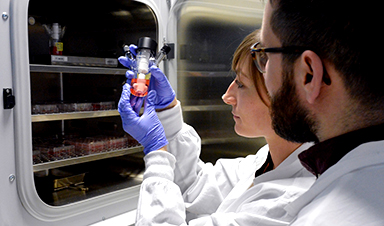Just what is COVID capable of doing to the human brain?
What they saw explained a lot: An “excessive number” of synapses, or connections between brain cells that allow them to communicate, were eliminated during the course of the disease—“more than you would expect to see in a normal brain,” the authors wrote in an Oct. 27 article on academic news site The Conversation.
In a process known as “pruning,” normal brains get rid of a certain amount of inactive synapses when they’re no longer needed, to make way for new ones. But the infected mini brains showed unnecessary and inordinate levels of the clean-up process, similar to the level seen in neurological disorders like schizophrenia, Alzheimer’s, and Parkinson’s disease, according to the authors.
What researchers witnessed may explain why many Long COVID sufferers report neurological symptoms, and why COVID seems to increase the risk of developing some neurological disorders.
It’s well established that those who’ve had COVID are at an increased risk for complications like stroke, memory problems, depression, anxiety, and migraines. More than a third of those who’ve had COVID report neurologic symptoms, according to a February article in Therapeutic Advances in Chronic Disease.
And it’s well known that some Long COVID sufferers experience neurologic symptoms like tremors, issues with movement, involuntary muscle contractions, seizures, hearing and vision issues, balance and coordination problems, and other Parkinson’s disease-like symptoms. The most frequent neurological symptoms of Long COVID include “brain fog,” headache, confusion, sleep disorders, mood disorders, issues with smell or taste, and dysautonomia, a disorder of the autonomic nervous system that can involve fainting, drops in blood pressure when standing, rapid heart rate, and other issues with involuntary bodily functions.
Nearly 20% of American adults who’ve had COVID—an estimated 50 million—report having Long COVID symptoms after their infection resolves, according to data collected by the U.S. Census Bureau this summer.
Long COVID is roughly defined as symptoms that persist or appear long after the initial COVID infection is gone, but a consensus definition has not yet been broadly accepted.
Many experts contend that long COVID is best defined as a chronic-fatigue-syndrome-like condition that develops after COVID illness, similar to other post-viral syndromes like those that can occur after infection with herpes, Lyme disease, and even Ebola. Other post-COVID complications like post-intensive-care syndrome should not be defined as long COVID, they say.
News
Scientists Find Way to Turn Tumor-Protecting Cells Into Cancer Killers
A new cancer therapy wakes up immune cells inside tumors and turns them against cancer. Tumors contain immune cells called macrophages that are naturally capable of attacking cancer. However, the tumor environment blocks these [...]
Analyzing Darwin’s specimens without opening 200-year-old jars
Scientists have successfully analyzed Charles Darwin's original specimens from his HMS Beagle voyage (1831 to 1836) to the Galapagos Islands. Remarkably, the specimens have been analyzed without opening their 200-year-old preservation jars. Examining 46 [...]
Scientists discover natural ‘brake’ that could stop harmful inflammation
Researchers at University College London (UCL) have uncovered a key mechanism that helps the body switch off inflammation—a breakthrough that could lead to new treatments for chronic diseases affecting millions worldwide. Inflammation is the [...]
A Forgotten Molecule Could Revive Failing Antifungal Drugs and Save Millions of Lives
Scientists have uncovered a way to make existing antifungal drugs work again against deadly, drug-resistant fungi. Fungal infections claim millions of lives worldwide each year, and current medical treatments are failing to keep pace. [...]
Scientists Trap Thyme’s Healing Power in Tiny Capsules
A new micro-encapsulation breakthrough could turn thyme’s powerful health benefits into safer, smarter nanodoses. Thyme extract is often praised for its wide range of health benefits, giving it a reputation as a natural medicinal [...]
Scientists Develop Spray-On Powder That Instantly Seals Life-Threatening Wounds
KAIST scientists have created a fast-acting, stable powder hemostat that stops bleeding in one second and could significantly improve survival in combat and emergency medicine. Severe blood loss remains the primary cause of death from [...]
Oceans Are Struggling To Absorb Carbon As Microplastics Flood Their Waters
New research points to an unexpected way plastic pollution may be influencing Earth’s climate system. A recent study suggests that microscopic plastic pollution is reducing the ocean’s capacity to take in carbon dioxide, a [...]
Molecular Manufacturing: The Future of Nanomedicine – New book from Frank Boehm
This book explores the revolutionary potential of atomically precise manufacturing technologies to transform global healthcare, as well as practically every other sector across society. This forward-thinking volume examines how envisaged Factory@Home systems might enable the cost-effective [...]
New Book! NanoMedical Brain/Cloud Interface – Explorations and Implications
New book from Frank Boehm, NanoappsMedical Inc Founder: This book explores the future hypothetical possibility that the cerebral cortex of the human brain might be seamlessly, safely, and securely connected with the Cloud via [...]
Global Health Care Equivalency in the Age of Nanotechnology, Nanomedicine and Artificial Intelligence
A new book by Frank Boehm, NanoappsMedical Inc. Founder. This groundbreaking volume explores the vision of a Global Health Care Equivalency (GHCE) system powered by artificial intelligence and quantum computing technologies, operating on secure [...]
Miller School Researchers Pioneer Nanovanilloid-Based Brain Cooling for Traumatic Injury
A multidisciplinary team at the University of Miami Miller School of Medicine has developed a breakthrough nanodrug platform that may prove beneficial for rapid, targeted therapeutic hypothermia after traumatic brain injury (TBI). Their work, published in ACS [...]
COVID-19 still claims more than 100,000 US lives each year
Centers for Disease Control and Prevention researchers report national estimates of 43.6 million COVID-19-associated illnesses and 101,300 deaths in the US during October 2022 to September 2023, plus 33.0 million illnesses and 100,800 deaths [...]
Nanomedicine in 2026: Experts Predict the Year Ahead
Progress in nanomedicine is almost as fast as the science is small. Over the last year, we've seen an abundance of headlines covering medical R&D at the nanoscale: polymer-coated nanoparticles targeting ovarian cancer, Albumin recruiting nanoparticles for [...]
Lipid nanoparticles could unlock access for millions of autoimmune patients
Capstan Therapeutics scientists demonstrate that lipid nanoparticles can engineer CAR T cells within the body without laboratory cell manufacturing and ex vivo expansion. The method using targeted lipid nanoparticles (tLNPs) is designed to deliver [...]
The Brain’s Strange Way of Computing Could Explain Consciousness
Consciousness may emerge not from code, but from the way living brains physically compute. Discussions about consciousness often stall between two deeply rooted viewpoints. One is computational functionalism, which holds that cognition can be [...]
First breathing ‘lung-on-chip’ developed using genetically identical cells
Researchers at the Francis Crick Institute and AlveoliX have developed the first human lung-on-chip model using stem cells taken from only one person. These chips simulate breathing motions and lung disease in an individual, [...]





















